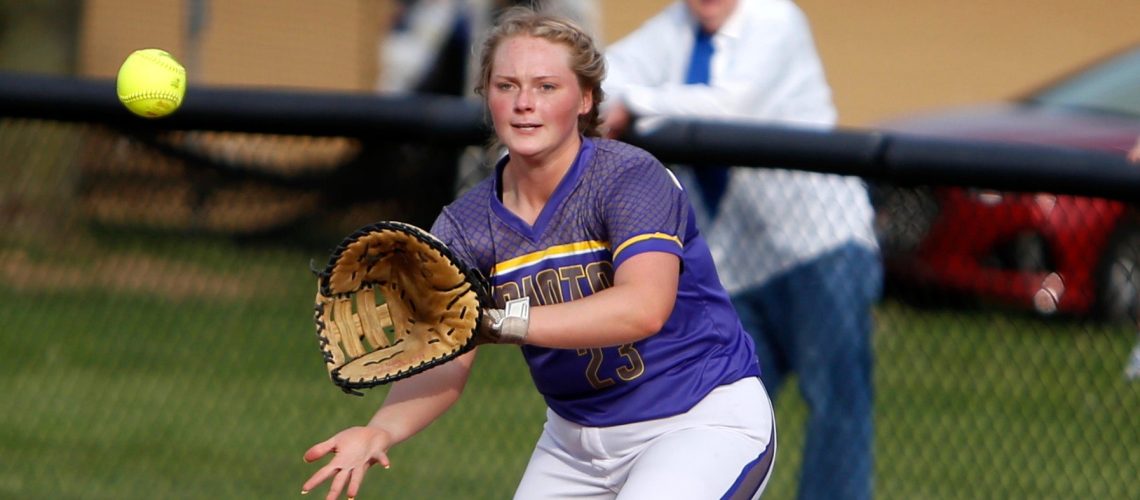Derrick Webb, Staff Writer
CHILLICOTHE — To this day, Unioto senior Tori Neff’s first base mitt has motivational blurbs inscribed on its inside leather.
“Be positive.”
“Head up.”
And so on and so forth.
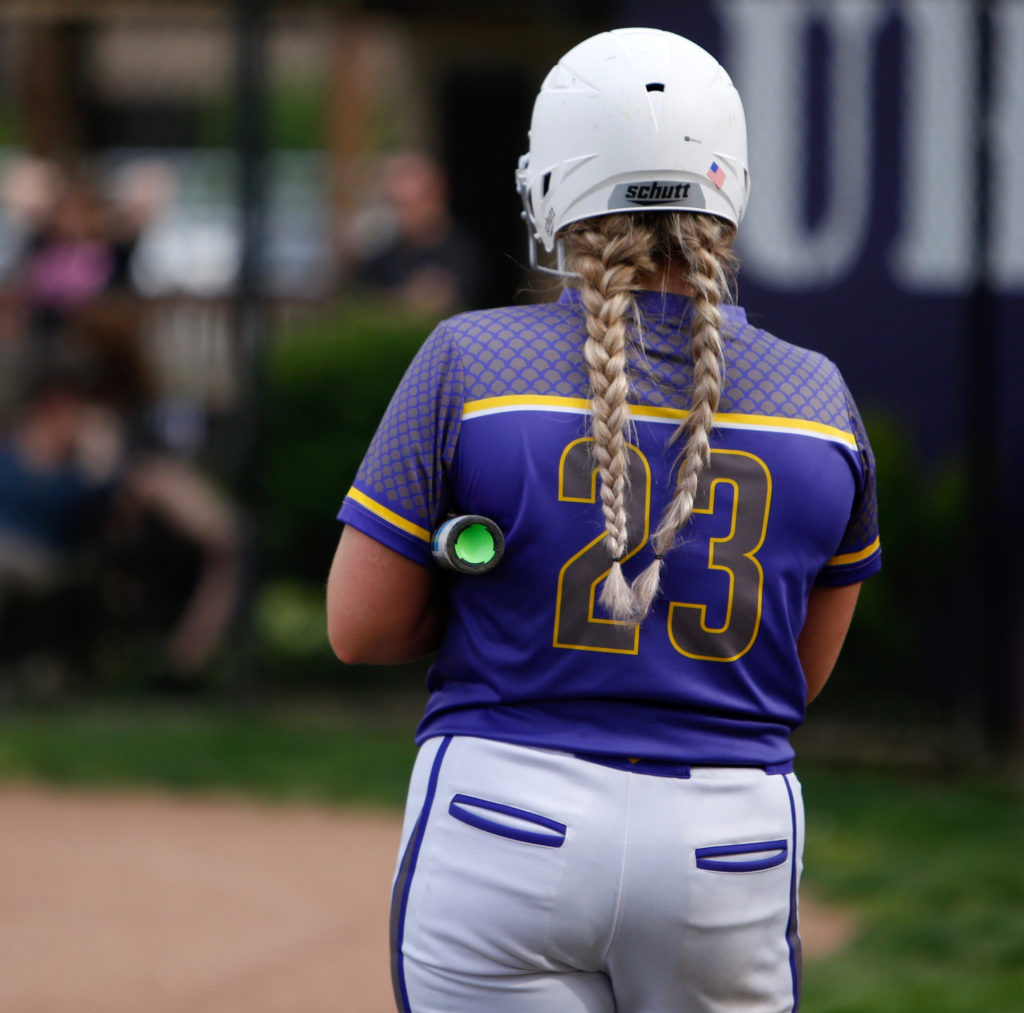
Now, she stands tall.
CREDIT: Jenny Campbell
They remind her that, no matter the score and no matter the outcome, she’s just lucky enough to lace up her cleats, walk into the batter’s box and face challenges that now seem miniscule.
“I have sayings written all over my glove. Just things that remind me that, at one point, I wasn’t able to do what I’m doing now,” Tori said. “I should do it to the best of my ability while I still can.”
Tori, a senior, was once told she may never be able to walk again. She’s defied those odds and stood tall in the face of adversity. But some would consider it a miracle she stands at all.
On Jan. 6, 2017, when a pop-up snowstorm spoiled a school day during her sophomore year, Tori and a group of her friends decided to celebrate by going sledding. And, as good as the day began, it ended in a life-altering injury that will affect Tori’s way of life for as long as she lives.
“THEY WEREN’T SURE I’D EVER WALK AGAIN.”
Upon impact, Tori knew something wasn’t right. A sharp pain shot up her back, a sobering level of discomfort enveloped her senses and, unable to move a muscle, panic started to set in.
“I went off a hill and there was like a six-foot drop-off that I didn’t see,” Tori recalled. “So whenever I landed, my back pretty much just shattered. I just remembered being really scared. I couldn’t move my legs. I could feel them a little bit but not really, so I knew it was something in my back.”
Tori laid in the snow for nearly an hour before paramedics made their way there. When they did arrive, they rushed her to Adena Regional Medical Center and, from there, to Children’s Hospital.
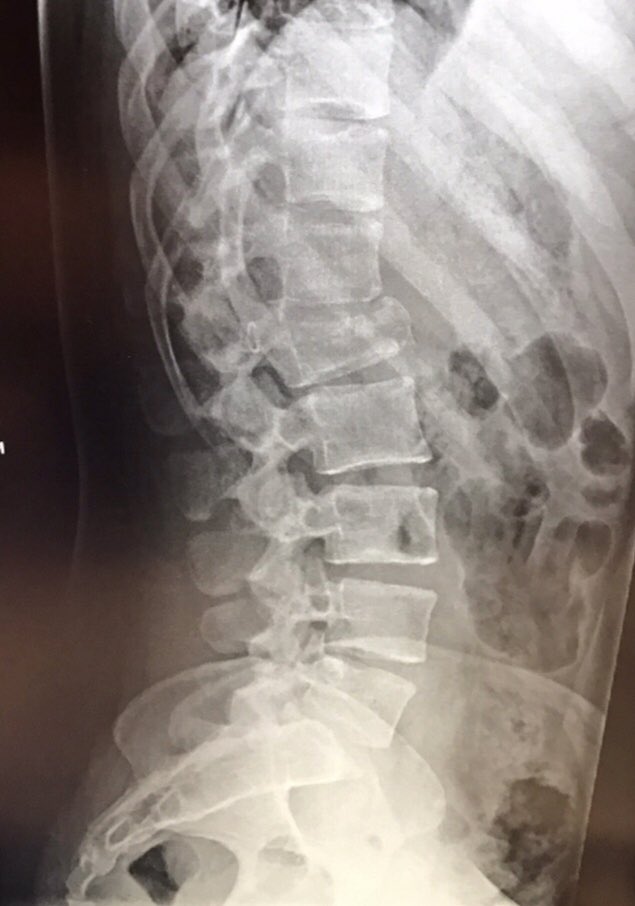
SUBMITTED PHOTO
“The EMT’s got there about an hour after it happened and I couldn’t move,” Tori said. “I was rushed up to Children’s Hospital and when I got there, my neurosurgeon told me that they weren’t really sure if I’d ever be able to walk again.”
Tori had suffered a burst fracture in her first lumbar vertebrae, which had been completely busted. She lost nearly 50 percent of the vertebrae altogether and an inch off her height because of the loss of bone and how it affected her posture.
By definition, the first lumbar vertebrae, or the L1 vertebrae, bears the weight of the upper body and acts as a transition between the thoracic and lumbar vertebrae.
That day, which lives in infamy for Tori and her family, was the start of a journey she never asked to go on. While she did indeed walk again, Tori endured a long, strenuous process to get to that point.
ROAD TO RECOVERY
As tests and x-rays started to show promising signs for what seemed like a distant future, Tori was still in pain, still in some level of shock and still having to deal with an everyday nuisance.
“We had to see how things progressed. I wasn’t able to move and I was on bed rest for about four days until they fitted me for a brace,” she said. “Even after I had a brace put on, it was still kind of a thing where different injuries affect different people in different ways. I wasn’t allowed to sit straight up, not even to eat, drink, shower or go to the bathroom. If I moved at all, my spinal cord could’ve been affected.”
Tori’s brace was one that stretched from the top of her chest to her waistline and covered her entire back. It wasn’t comfortable, it wasn’t welcome but it was necessary in her recovery.
And even with the brace acting as a protective bubble, there were many sleepless nights and many fearsome days ahead. When she was finally given the OK to try and walk, she vomited the first five times she attempted.
Her body had been laying in bed so long, it had adapted to its habitat. It wasn’t used to the sudden change.
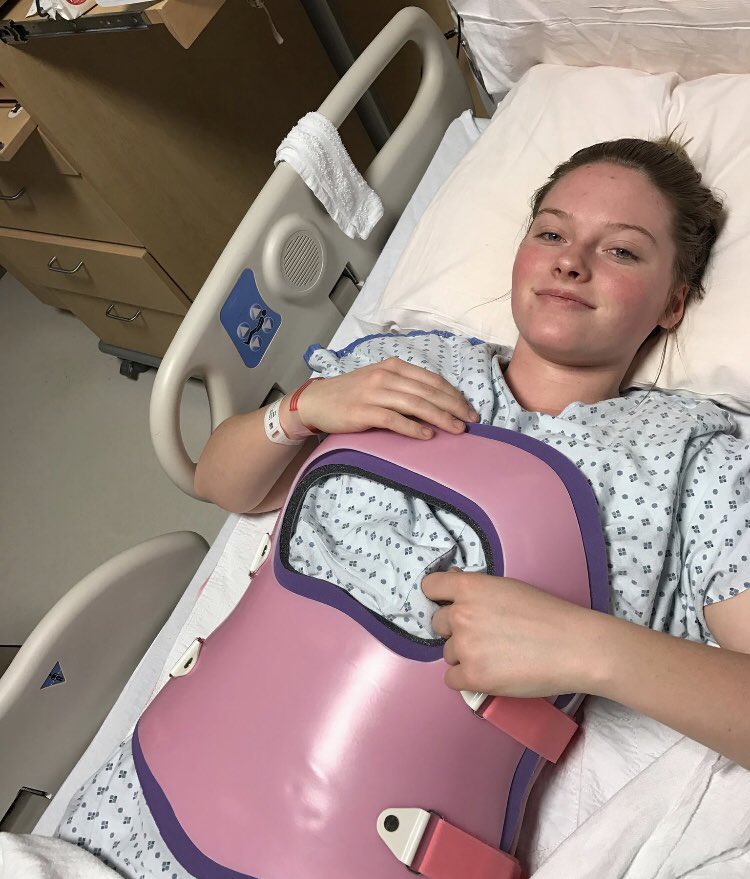
SUBMITTED PHOTO
“For the following five or six weeks, it was pretty scary. I wasn’t allowed to sleep by myself so I wouldn’t fall off the bed. I was in my brace 24/7,” Tori said. “If I wasn’t in my brace, anything could’ve shifted and [the seriousness of the injury] could change quickly. For the first couple of weeks, I couldn’t sleep because I was scared I might wake up and not be able to move at all.”
Then, of course, there were doctor’s appointments.
“Doctors appointments were kind of weird. After I did it for the first five months, I went every two weeks and got x-rays,” Tori said. “So at any moment, if [the doctor] saw any change, I would be going into surgery.”
All the while, Tori was forced to put her first two loves aside. She certainly couldn’t do anything with a softball and she wasn’t able to properly take care of her cattle, which she shows for 4H.
“That was one of the hardest parts,” Tori said. “I enjoy playing softball and showing my cattle. I wasn’t allowed to lift anything over five pounds from January to August so both were out.”
LESSONS LEARNED
There were times during her recovery where Tori’s mom Tammy would let Tori take her brace off and breath a little. Those days, as Tori calls them, were “the best days.”
But when she got news she could take her brace off for good … well, that was another type of feeling.
“Just hearing that I could move and take off my brace that I had been wearing 24/7 from January until June … that about made me cry,” she said. “The brace was probably one of the most annoying things, trying to get dressed and do daily things with that on. It’s hard to put into words how emotional it all really was. It was a unique situation. Not everybody goes through a burst fracture in their back.”
First came the shedding of the brace and then came the go-ahead to participate in softball and 4H, which doctors were reluctant about. Tori, however, was not.
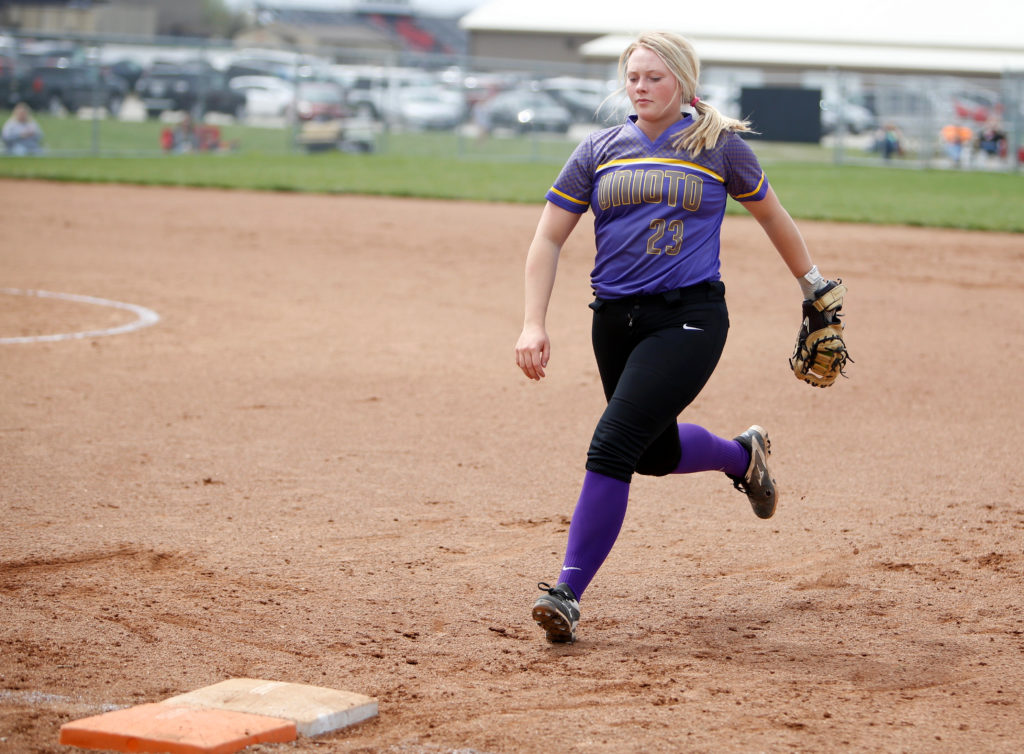
CREDIT: Jenny Campbell
The first thing she did when doctors told her she could throw again was play catch at Unioto’s softball field with her dad, Todd.
And, after being sidelined her entire sophomore softball season and missing the brunt of her junior year, she’s now starting on a team and holding her own that sits at 18-5 overall — before Wednesday’s Division II sectional final against Jackson.
“I came back a little last year but it was rough getting situated. For the most part now, I’m back to normal,” Tori said. “But I’ve still got limitations and I still play through a lot of pain. But those are things I’m just going to have to get used to. I’ll never be normal. There are good and bad days.”
A moment that Tori remembers more than most is a hit she had in an exhibition game against Notre Dame this past March. It was a double that didn’t count towards her official season statistics. But in her mind, it’s one of the best base hits she’s ever had.
“That was the first time since my freshman year that I’ve had a good, solid hit. It just felt amazing,” she said. “I was smiling so much while running to first. It just felt so good to swing and not have to experience so much pain.”
While she certainly hopes there are more hits like that to come before her senior year comes to an end, alongside more wins, she also realizes that softball is indeed just a game.
“I’ve learned not to care much about stats or placing in 4H,” she said. “I can swing a bat. I can walk. So I’m happy with it. It’s just amazing to me that I can be out there after what happened.”
Tori also says that cold, snowy day helped her realize the true value of those around her who have helped her through, not just the injury, but all of life’s ups and downs.
“Without my parents, my sister [Karee], and my grandparents, I would not be where I am today. They are my best friends. I wouldn’t be where I am with softball or cattle or anything,” Tori said. “They were right next to me when I took my first steps. Having them is amazing. I see a lot of other kids’ relationships with their parents. As sad as some of those are, it helps me realize how thankful and blessed I am to have the family that I do have.”
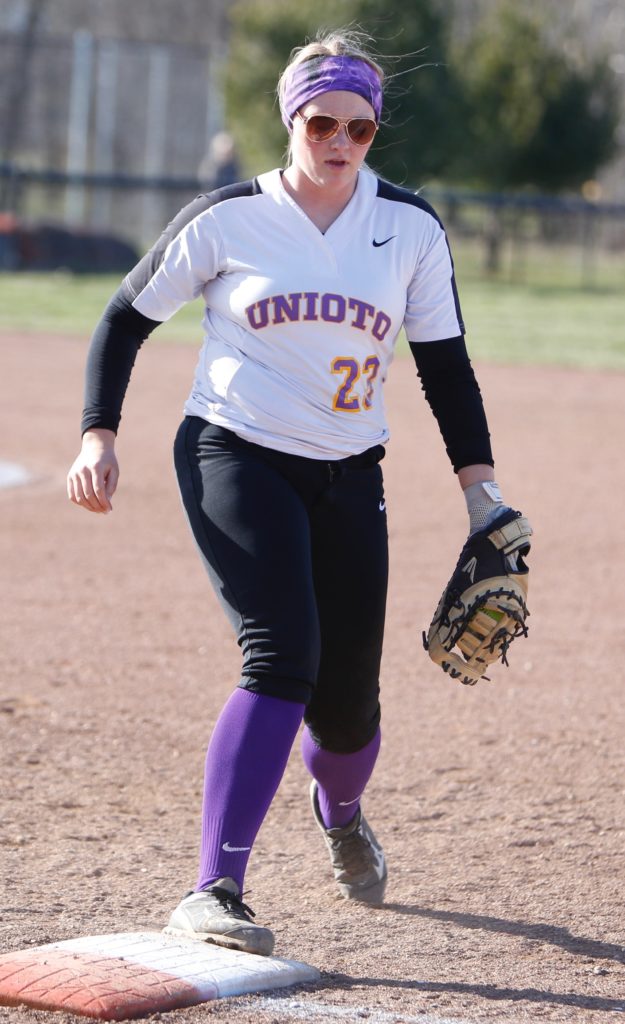
In the blink of an eye, on that infamous January day, Tori’s life changed significantly. She still feels the effects of the burst fracture, still plays through a decent amount of pain and still makes yearly trips to Children’s Hospital just to make sure everything is in order.
Those trips are a chilling reminder of what happened, but they’re also a reminder that she now stands tall after beating adversity to a pulp.
Tori’s next adventure includes plans to attend Shawnee State University while pursuing a degree in radiology. She’d like to be a radiology tech because of the “time spent in hospitals and x-ray rooms” and the “positive impact” her doctors had on her.
As she pens that next chapter, she won’t be taking anything for granted while living life to the fullest. After all, that opportunity was almost stripped from her for good.
“Don’t take anything for granted. I spent a lot of time with my parents. Before [the injury], I was going through that teenage phase whereas after it, I realized that I was only going to have so long with them,” Tori said. “I knew I couldn’t take them for granted. When something like that happens to you, you realize that you have to live while you’re young and that every day matters.”


